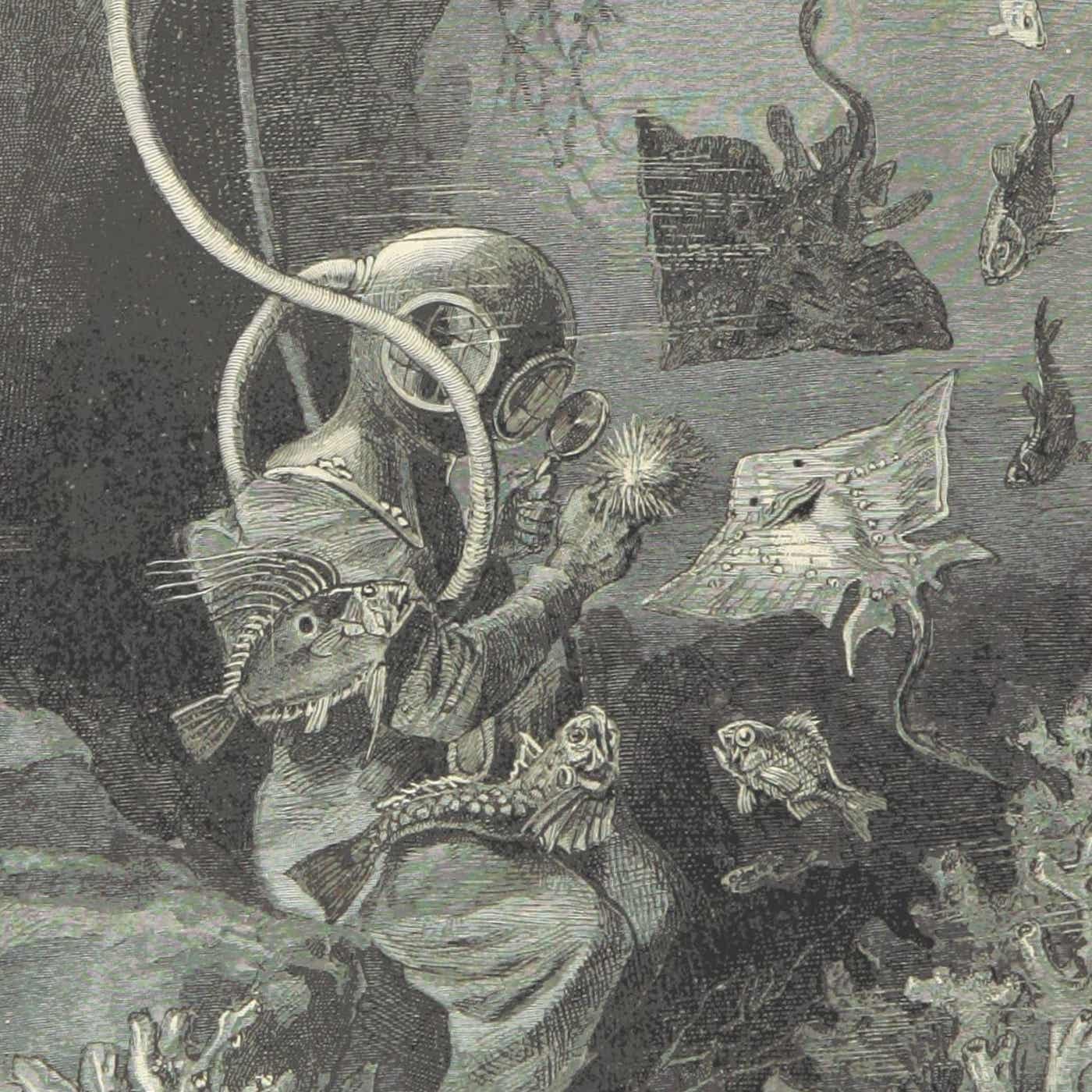 |
NeuroDivinga philosophy podcast about neurodivergence Author: Amelia Hicks
a philosophy podcast about neurodivergence neurodiving.substack.com Language: en Genres: Philosophy, Science, Social Sciences, Society & Culture Contact email: Get it Feed URL: Get it iTunes ID: Get it |
Listen Now...
Episode 7: "Deliberative Empathy"
Thursday, 7 August, 2025
We did it! We’ve arrived at the final episode of Season 1. This episode picks up where episode 6 left off, by diving even deeper into the question: what’s the relationship between empathy and morality?As always, you can find a (not Substack-generated) transcript of the episode, as well as a music-free remix, here.“Deliberative Empathy”In our last episode, we met Ryan.Ryan is a minister who has devoted his life to serving others. Yet, at one point, a psychologist told him he had “no empathy.”Surprisingly, Ryan could sort of see their point. He knew he experienced empathy differently than most people. He was even a little skeptical of whether empathy deserves the pedestal we often put it on.But hold on—even if empathy isn’t perfect, couldn’t it still be really important?In this episode, we explore a broader, richer view of empathy. Maybe empathy isn’t a magic spark you either have or lack (which can be detected by a perfectly tuned psychometric test). Maybe empathy is more like a set of muscles we can exercise. According to this view, empathy is not merely a feeling, but a complex set of skills. These skills can look different from person to person, and can be learned, practiced, and strengthened over time.To help us unpack all this, we spoke with the philosopher Heidi Maibom, who makes the case that empathy is far more than an emotional reflex. Instead, Heidi argues that empathy is a deliberate practice that plays a crucial role in living a moral life.Topics Discussed* Recap! (00:24)* Why we care about (and try to measure) empathy: we often assume that having empathy is necessary for being a good person. (01:29) * The original (and very dangerous) myth that autistic people don’t have empathy, and its relationship to the “ToM-deficit” view of autism. (01:52)* A new myth: autistic have empathy and have a ToM deficit—which means that autistic people are like the mirror image of psychopaths. But this new myth comes with problems of its own. (03:06)* There are so many different types of empathy! But are these long lists of different types of empathy useful? How are all these different types of empathy related? (06:32)* An alternative way of thinking about empathy: it’s a four-step process (Fletcher-Watson and Bird, 2020) . The third step is the most important—and autistic people tend to be really good at that third step. (07:37)* But wait—maybe we need to further complicate how we think about empathy. (12:16)* Meet Heidi! (14:04)* Heidi’s personal story illustrating the complexity of the empathy process. (14:56)* Heidi’s view of empathy: it’s a set of skills that allows us to navigate interpersonal negotiations. (17:40)* It’s totally possible that autistic people engage in this process differently—but that doesn’t entail any sort of “empathy deficit.” (18:17)* We should think about empathy developmentally. (20:27)* Recall: some people are pretty skeptical of empathy’s importance. (22:23)* But in spite of these criticisms, Heidi maintains that empathy is really important. (24:33)* Heidi suggests some ways to “do” empathy better. (26:56)* Heidi thinks empathy is important for living a good, moral life, because morality isn’t just a simple set of rules. (28:49)* Empathy is also helpful for reflecting on your own actions (hat-tip to Sartre). (32:02)* Plus, empathy is useful for recognizing the full value of other people. (33:06) * Heidi’s response to the criticism that empathy is biased. (33:52)* The complexity of the empathy process opens up many different ways of “doing” empathy. (37:58)* We can all deliberately practice flexing our empathy muscles. Could this help non-autistic people empathize with autistic people? (39:14)Sources Mentioned* For more on how a person’s “psychopathic” tendencies could be channeled into pro-social behavior: * Ohikuare, “Life as a Nonviolent Psychopath,” The Atlantic (2014).* Gagne, Sociopath: A Memoir (2024).* The new myth about autism, empathy, and psychopathy:* Maguire, et al., “The relationship between psychopathy and autism: a systematic review and narrative synthesis,” Frontiers in Psychiatry (2024).* Heidi Maibom’s work on empathy:* An overview: https://www.heidimaibom.com/empathy* Heidi’s books: https://www.heidimaibom.com/books* Heidi’s articles: https://www.heidimaibom.com/articles* Fletcher-Watson and Bird, “Autism and Empathy: What are the real links?” Autism, Vol. 24, Issue 1 (2020).* Examples of how DBT might boost empathy: * Giles, et al., “A thematic analysis of the subjective experiences of mothers with borderline personality disorder who completed Mother-Infant Dialectical Behaviour Therapy: a 3-year follow-up,” Borderline Personality Disorder and Emotion Regulation, Vol. 11, Article 25 (2024).* Mardani, et al., “The Impact of Dialectical Behavior Therapy in Reducing Emotional Exhaustion and Enhancing Empathy,” Journal of Personality and Psychosomatic Research, Vol. 1, No. 3 (2023).* Research on DBT and autism: * Keenan, et al., “Leveling Up Dialectical Behavior Therapy for Autistic Individuals with Emotion Dysregulation: Clinical and Personal Insights,” Autism in Adulthood, Vol. 6, No. 1 (2024).* Bloom, Against Empathy (2016).* Research on “thin slice” judgments, in which non-autistic people make negative snap judgments about autistic people:* Sasson, et al., “Neurotypical Peers are Less Willing to Interact with Those with Autism based on Thin Slice Judgments,” Scientific Reports (2017).* Research on autism and bullying:* Trundle, et al., “Prevalence of Victimisation in Autistic Individuals: A Systematic Review and Meta-Analysis,” Trauma, Violence, and Abuse, Vol. 24, Issue 4 (2023). * Ryan Althaus:* From Emaciated to Emancipated: The Story of a Skinny Mango (2023).* Even more books by Ryan!* Ryan’s radio show. * More on how everyone needs to flex their empathy muscles: “How to Really Know Another Person” (Hidden Brain, 2022)CreditsHosting, Research, Fact-Checking, Script-Editing: Amelia Hicks and Joanna LawsonGuests: Heidi Maibom and Ryan AlthausMusic and Audio Production: Amelia HicksThank-YousA huge thank you to Heidi Maibom for helping us complicate our concept of empathy! Be sure to check out her books and articles, mentioned above.Thanks again to Ryan Althaus, for all his insights.And thanks to the Marc Sanders Foundation and the Templeton Foundation for their support of the show. This is a public episode. If you would like to discuss this with other subscribers or get access to bonus episodes, visit neurodiving.substack.com








